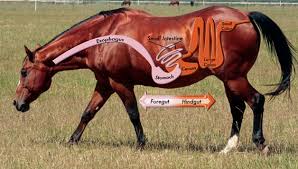
Colic in horses is a relatively common disorder of the digestive system. Although the term colic, in the true definition of the word, simply means “abdominal pain,” the term in horses refers to a condition of severe abdominal discomfort characterised by pawing, rolling, and sometimes the inability to defecate.
There are a handful of different types of colic, depending on the cause of the condition. There is also a spectrum of severity in this condition; oftentimes a horse may have a mild bout of abdominal pain that resolves with a single dose of medication whereas other times, surgery and unfortunately euthanasia may be warranted. For this reason, all colic should be treated as an emergency.
If you suspect your horse is displaying colic symptoms, seek immediate veterinary assistance. There are different treatment options for horses suffering from colic, but this is an illness in which course and treatment can really vary on a case-by-case basis.
You should become familiar with the symptoms of colic to quickly identify the condition. Knowing how to take your horse’s vital signs (heart rate, respiratory rate, and mucus membrane colour) is important information to relay to your veterinarian. A stethoscope to listen for gut sounds is also a wise investment to have in your emergency kit in the barn.
Once your veterinarian has arrived, there are a variety of diagnostic procedures he/she will do to confirm colic and further characterise its cause and severity. First, the veterinarian will check the horse’s pulse, temperature, mucus membrane colour, and evaluate the gut sounds. Your vet will ask you detailed questions on the horse’s most recent behaviour. Then the vet may sedate the horse. This will make the horse more comfortable and make it safer to perform more invasive diagnostics.





